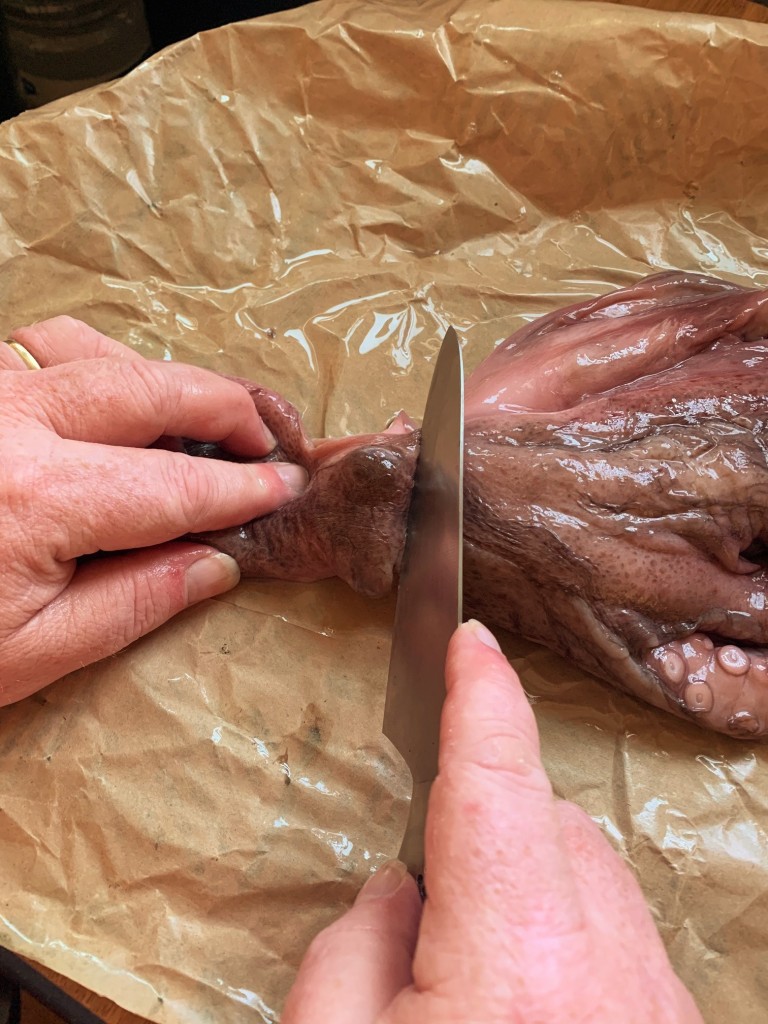
Seems like almost exactly a year ago I was writing about pulpo/polvo/octopus, then I got caught up in the business of actually moving to Portugal (not there yet), and then the plague hit. Although I have been in the kitchen a fair bit, I’ve been away from the blog. I am intending to change that, but it is subject to intervention from a couple of governments, a shipping company, a real estate agent, and life during COVID-19.
Since I can’t be in Portugal (as is the case for most of us living in America at present), the next best thing is to bring a bit of Portugal to California.
This particular stew is by no means uniquely Portuguese; in Catalunya, there’s a version known as Estofat de pop i patata; in Greece, you can find the very similar Octapodi Kokkinisto, though it’s usually served over rice or orzo rather than with potatoes; in Italy, it’s Polpi in Umido and Polpo alla Luciana, often including clams or other seafood and served with pasta or just bread. And in Galicia, Pulpo a la Gallega omits the tomatoes, but is frequently served over boiled potatoes. I’m sure if I dug a bit deeper, I could find Croatian and Turkish versions of the dish; heck, even the French might have one, although their version would probably be more elegant, since that’s what they do. From what I can gather, this one originated in the Azores, some say specifically on Pico Island.
In most Mediterranean (and Mediterranean-adjacent) countries, polvo guisado is peasant food; the cephalopod was pulled out of the sea, and the tomatoes and potatoes came out of your garden. No real fancy ingredients are necessary (although I did use a South African Pinotage Rosé, because the South African wine industry is currently in desperate straits due to COVID-19).
One quick note before we get to the actual recipe: a number of friends and acquaintances on social media find the eating of octopuses distasteful. They (the cephalopods) seem to be intelligent creatures, and many people, myself included, find them endearing. I understand and respect those whose ethics have led them away from creature consumption, and am happy to engage in conversation on that topic over the telephone or in person, but social media lack the capacity for nuance, so comments will be moderated. If this recipe is not to your taste, please feel free to avail yourself of one of the many vegetarian and vegan options on the blog.

INGREDIENTS
2 lbs. / 1kg octopus, blanched and cleaned
2-3 tbsp. / 30-45ml olive oil
2 large onions, chopped
4 large cloves minced garlic
3 bay leaves
4.25 cups / 1000ml chicken or fish stock (I used Aneto)
2 cups / 500ml wine (rosé, white, and red all work fine)
2 lbs. / 1kg fresh (or canned) tomatoes, chopped (peeling optional)
2 lbs. / 1kg new potatoes (or fingerlings, or whatever you have)
1 thsp. / 5g crushed red pepper flakes
1 bunch fresh cilantro (coriander), chopped
1 bunch fresh parsley, chopped
1-2 small lemons, juiced (or 2-3 tbsp. / 30-45ml lemon juice)
Salt and pepper (to taste)

DIRECTIONS
Set a large pot of salted water on the stovetop to boil.
Remove the octopus’ eyes, ink sacs, beak, and interior of the head (if not pre-cleaned by your fishmonger) then rinse under cold water and set aside.
If you’re using medium or large potatoes, wash and quarter them (peeling is optional), and set aside.
Chop onions and mince garlic and set aside.
Chop cilantro and parsley fairly fine and set aside.
Dip the octopus three times into the salted boiling water to curl the tentacles, then submerge it for 5 minutes.

Drain and let it cool, then cut the tentacles and body into 2-inch lengths or chunks and reserve.
In that same pot, add the olive oil; add the onions, garlic, pepper flakes, and bay leaves, stirring occasionally. Fry in the oil for 6 to 7 minutes, until slightly wilted and beginning to brown.
Deglaze the pan with the wine, bring the liquid up to a boil and reduce it by half.
Stir in the tomatoes, season with salt and pepper, add the potatoes, the octopus, and stock. (Note: I used chicken stock, but fish or vegetable stock will also work, and if necessary, you could just use water with perhaps a bouillon cube or paste.)
Bring the liquid up to a boil and reduce to a simmer.

Cover the pot and simmer for about 90 minutes on low heat.
Add the lemon juice, fresh chopped cilantro (a/k/a coriander), and parsley. Simmer for another 5 minutes or so (it’s okay to go longer).
Adjust the salt and pepper (if necessary), fish out the bay leaves (if you can), allow the stew to cool slightly and serve.
Serve with crusty bread or rolls (optional) for mopping up the sauce.
Incidentally, a nice vinho verde goes nicely with the stew, but don’t be fussy about red or white; both are fine.

